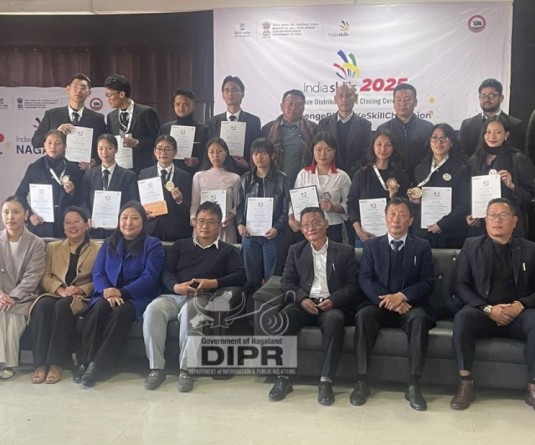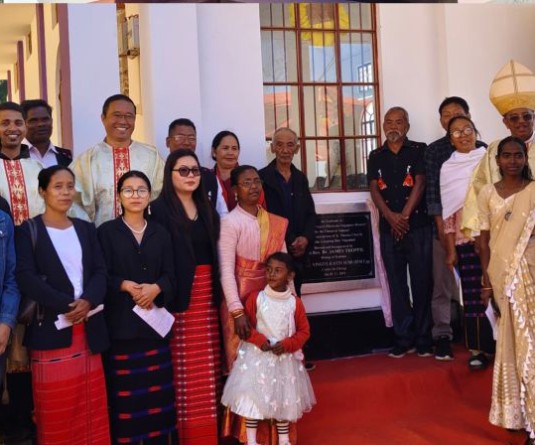
Our Correspondent
Mokokchung | August 24
Convergence is the catch word; a convergence of all the state sponsored projects working towards one end – the welfare of Naga farmers.
In a brain storming session held today at the Institute of Information Technology and Communication (ICIT) in the presence of the Advisor Information Technology & Communication, Engineer Vikho-o Yhoshu and attended by top officials of the IT Department, Kohima, the need to make the ICIT not only an institute of information technology and communication but also to make it a centre of convergence of all the state sponsored programmes like the NEPED, NBDA, NBRM, NBHM where they can meet together and work for the welfare of the common man.
In a very thoroughly prepared power point presentation at the ICIT conference hall here today, the Joint Secretary and NEPED Deputy Team Leader Raj Verma, asserted that all the programmes like the NEPED, NBDA, NBRM, NBHM have one thing in common – they work for the Naga farmers. “If we reverse the telescope and see, then we (NEPED, NBDA, NBRM, and NBHM) would see the Naga farmers at the end. We have to share our experiences and create interdependence among the different agencies working for the welfare of the Naga farmer,” said Verma.
He disclosed that the idea of convergence came about after a through discussion held at the Tourist Lodge, Mokokchung on March 5 and 6, 2010 which was chaired by the Additional Chief Secretary and Development Commissioner Alemtemshi Jamir. The outcome of the meeting at Mokokchung was the agreement of all the state agencies like NEPED, NBDA, NBRM, NBHM opening up small projects like bamboo plantation by the NBDA; setting up of Apiary by NBHM; jhum cultivation research by the NEPED and setting up of a medicinal plant garden by the NBRM. All the projects would be interrelated and research based.
Raj Verma asserted that the opening up of a medicinal plant garden and the Apiary nearby would ensure that the bees take the nectar from the medicinal plant and make it into honey which in turn would become – medicinal honey. “We want the ICIT to be a place where the horticulture, the agriculture department and the like to converge here so that we can not only show the outside world about our findings and get their reaction, but also teach the outside word,” he maintained.
In this regard, he proposed the setting up of a ‘State-of-the-art Centre for Climate Change Studies (C3S)’ at the institute for which GTZ (German Technical Cooperation) is being consulted. This C3S at the ICIT would have the essential components like: Instrumentation/database/lab/ alternative tech; Global outreach, training, testing; Trans-border climate issues of Eastern Himalayas; Data backed national/ international policy action; Training on participatory technologies.
The C3S would ensure that that it delivers Research and documentation like creating the protocols for action-research towards building Climate Change resilience of farmers; Developing the knowledge pool (think tank; Building networks-local and regional (e.g. CCL’s); Analyzing ‘voices from the field’; From anecdotal to evidence based policies
It would essentially looks towards organizing people-led social and civic action on climate change based on global research inputs linked to indigenous solutions. Talking about climate change (which NEPED is so closely associated with) Raj Verma the NEPED Deputy Team Leader, asserted that the topic of climate change is simply a story, but with this ‘convergence’ and setting up of the C3S the topic of climate change can be thoroughly researched into and ‘evidence’ about the affects of climate change in the society can be shown to the public which can have a bigger impact on the efforts against climate change.
So where the ICIT does fits in all this. The Deputy Team Leader of NEPED Raj Verma maintained that the Institute of Information Technology & Communication is located ‘in the heart of Nagaland and Jhum country’ with an altitude of 1021 to 1397 meters above MSL. It has close ‘proximity to NU & grassroots stakeholders’. Besides, being ‘autonomous’ the institute is ideal for in situ & ex situ action research. It is also ideally poised for bridging digital divide, and also the technology GIS, Internet, HR is available at the institute. He said that the institute with the ‘convergence’ of the different agencies and departments can become a “window for Nagaland to the outside world”.




